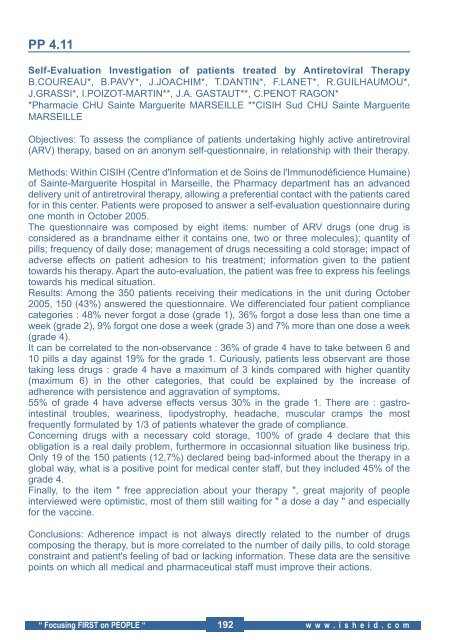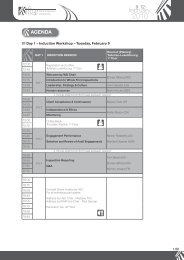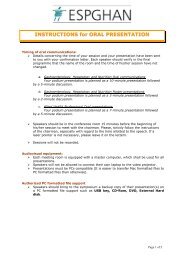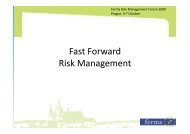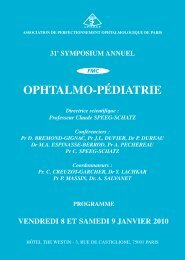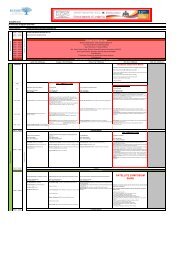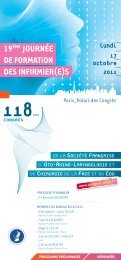final program.qxd - Parallels Plesk Panel
final program.qxd - Parallels Plesk Panel
final program.qxd - Parallels Plesk Panel
Create successful ePaper yourself
Turn your PDF publications into a flip-book with our unique Google optimized e-Paper software.
PP 4.11<br />
Self-Evaluation Investigation of patients treated by Antiretoviral Therapy<br />
B.COUREAU*, B.PAVY*, J.JOACHIM*, T.DANTIN*, F.LANET*, R.GUILHAUMOU*,<br />
J.GRASSI*, I.POIZOT-MARTIN**, J.A. GASTAUT**, C.PENOT RAGON*<br />
*Pharmacie CHU Sainte Marguerite MARSEILLE **CISIH Sud CHU Sainte Marguerite<br />
MARSEILLE<br />
Objectives: To assess the compliance of patients undertaking highly active antiretroviral<br />
(ARV) therapy, based on an anonym self-questionnaire, in relationship with their therapy.<br />
Methods: Within CISIH (Centre d'Information et de Soins de l'Immunodéficience Humaine)<br />
of Sainte-Marguerite Hospital in Marseille, the Pharmacy department has an advanced<br />
delivery unit of antiretroviral therapy, allowing a preferential contact with the patients cared<br />
for in this center. Patients were proposed to answer a self-evaluation questionnaire during<br />
one month in October 2005.<br />
The questionnaire was composed by eight items: number of ARV drugs (one drug is<br />
considered as a brandname either it contains one, two or three molecules); quantity of<br />
pills; frequency of daily dose; management of drugs necessiting a cold storage; impact of<br />
adverse effects on patient adhesion to his treatment; information given to the patient<br />
towards his therapy. Apart the auto-evaluation, the patient was free to express his feelings<br />
towards his medical situation.<br />
Results: Among the 350 patients receiving their medications in the unit during October<br />
2005, 150 (43%) answered the questionnaire. We differenciated four patient compliance<br />
categories : 48% never forgot a dose (grade 1), 36% forgot a dose less than one time a<br />
week (grade 2), 9% forgot one dose a week (grade 3) and 7% more than one dose a week<br />
(grade 4).<br />
It can be correlated to the non-observance : 36% of grade 4 have to take between 6 and<br />
10 pills a day against 19% for the grade 1. Curiously, patients less observant are those<br />
taking less drugs : grade 4 have a maximum of 3 kinds compared with higher quantity<br />
(maximum 6) in the other categories, that could be explained by the increase of<br />
adherence with persistence and aggravation of symptoms.<br />
55% of grade 4 have adverse effects versus 30% in the grade 1. There are : gastrointestinal<br />
troubles, weariness, lipodystrophy, headache, muscular cramps the most<br />
frequently formulated by 1/3 of patients whatever the grade of compliance.<br />
Concerning drugs with a necessary cold storage, 100% of grade 4 declare that this<br />
obligation is a real daily problem, furthermore in occasionnal situation like business trip.<br />
Only 19 of the 150 patients (12,7%) declared being bad-informed about the therapy in a<br />
global way, what is a positive point for medical center staff, but they included 45% of the<br />
grade 4.<br />
Finally, to the item " free appreciation about your therapy ", great majority of people<br />
interviewed were optimistic, most of them still waiting for " a dose a day " and especially<br />
for the vaccine.<br />
Conclusions: Adherence impact is not always directly related to the number of drugs<br />
composing the therapy, but is more correlated to the number of daily pills, to cold storage<br />
constraint and patient's feeling of bad or lacking information. These data are the sensitive<br />
points on which all medical and pharmaceutical staff must improve their actions.<br />
“ Focusing FIRST on PEOPLE “ 192 w w w . i s h e i d . c o m


